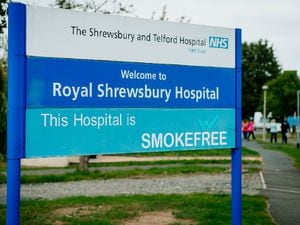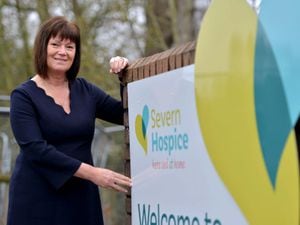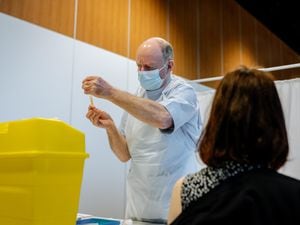30 today: Severn Hospice marks three decades of peerless care for those in need
It has been 30 years to the day since Severn Hospice first opened its doors.
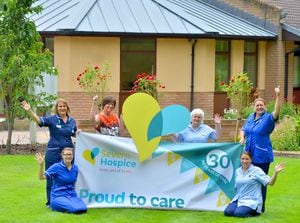
In the years since, more than 34,000 people across Telford, Shropshire and Mid Wales have been cared for by the charity.
Heather Palin, chief executive at the hospice, said everybody at the hospice was thankful for the public’s help in raising its required £8 million each year.
“It’s incredibly challenging to raise the amount we need to,” she said. “We’re very grateful for the commitment of our public.”
For thirty years, Severn Hospice has been helping people through some of life’s toughest moments.
It was exactly three decades ago, on July 12, 1989, that the first patients were admitted to the Shropshire and Mid Wales Hospice.
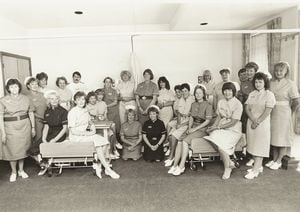
A lot has changed since then. Costs have gone up, care in the community has grown in importance, and even the name has been given an update.
But one thing has remained exactly the same – the dedication to making sure those with incurable diseases are given the very best care possible.
Today thousands of people give up their time and money to help support the hospice, which needs to raise £8 million each year in order to continue providing its support.
But it is getting harder and harder to cover the costs of the vital service.
Last year, 2,740 people were supported by Severn Hospice – with four out of five of those cared for at home.
It costs less, but it also is close in line with what patients actually want. It is a far cry from how things were run in 1989.
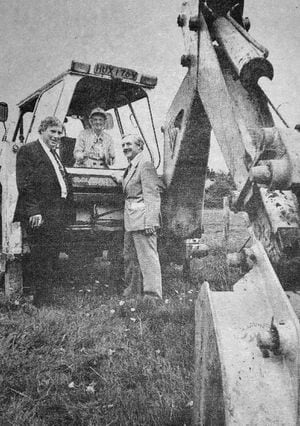
Heather Palin, chief executive at the hospice, said: “When we opened there had been a big appeal to open Shropshire’s first hospice, and we’ve grown over the years.
“We started off with one ward. The hospice has been on a journey, and that journey has changed because what people need has changed.
“Back in 1989, every patient who was referred to the hospice came to a bed.
“Now it’s only one in five patients that need a bed. We help patients in so many different ways.
“We’re focused on enabling people to reach their own goals and to stay at home as long as possible.
“We are hoping to reach people earlier in their illness, even if it’s just to give advice.”
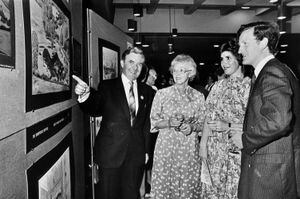
She added: “We are here to help people. We can’t make them better, but we can help them deal with their illness and be more in charge of where they receive their care.”
In 1981, a public meeting was called by former nurse Sheila Laws at Shrewsbury Castle to persuade the powers that be that Shropshire needed its own hospice.
It took four years to launch a fundraising appeal, and it was another four years before the new hospice was finally finished. On the day it opened, appeal director Mike Domoney said its arrival in Shropshire had been long overdue.
“This is a wonderful day for us all,” he told reporters at the time.
“It comes as the result of eight years of hard work.
“It will be a day of great emotion and we are absolutely thrilled that at long last we are able to start giving something back to all the generous folk of Shropshire and Mid Wales who made this dream come true.”
It is that sentiment that has made Severn Hospice a cause close to many hearts in Shropshire.
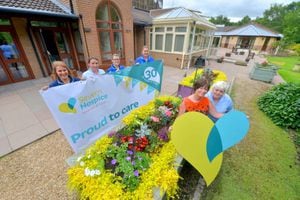
Each year hundreds take part in the hospice’s charity events, which include colour runs, film screenings, and more.
Events organisers throughout the county use Severn Hospice as their chosen charity, and people are happy to dig deep to offer up their change to help keep it running.
It ensures that people are given the right care to help them through a painful period of their life, and Ms Palin said the hospice is thankful for everything people do.
“It’s incredibly challenging to raise the amount of we need to,” she said.
“We’re very grateful for the commitment of our public.
“The hospice starts the financial year with an empty bank account. People are under pressure in their own finances, and there’s always the risk one day we won’t be able to afford the amount we need. We have to fight hard for our NHS funding – it’s the only element of our funding that’s been guaranteed.
“That does concern us.”

Find out more:
Visit severnhospice.org.uk
Twitter - @severnhospice
Facebook - @severnhospice
Instagram - @severn_hospice
Earlier this year it was announced that Telford & Wrekin Clinical Commissioning Group was cutting its Severn Hospice funding by about £250,000.
The CCG’s annual grant to the charity was cut from £1.1 million to £850,000.
“We’re all aware of the pressures within the NHS,” Ms Palin said.
“For every patient that come through our ward or community services, it’s a patient that doesn’t have to go through the doors of the NHS. The hospice’s existence saves money for the NHS.
“It is important to maintain funding – we’re not asking for more, but we would like the NHS to recognise the contribution the hospice makes. If patients can’t come to us, they’ll go to hospital and GPs more.”
The cut in funding has triggered a look at how many beds the service actually needs, and how they should be split between the hospices in Shrewsbury and Telford. It’s part of the next step in Severn Hospice’s ever-changing journey.
“We’re looking at activity data, length of stay, intervention patients need while they’re with us, and looking at whether any of those can be added to the community provision,” Ms Palin continued.
“We have a responsibility to evidence why we need beds and how many we need. We’ve got 16 at Shrewsbury and seven at Telford, so that’s slightly disproportionate and we know Telford is continuing to grow. We need to understand how many beds we need across the two sites, so we can have informed discussions about future plans.”
Mindful
Whatever those plans may include, and regardless of the cuts they face, Ms Palin is certain that Severn Hospice will still be an important part of Shropshire life in another 30 years.
In June it was announced that Acorns Children’s Hospice in Walsall would be shutting because of a lack of funds.
And up and down the country, charities big and small are trying to make ends meet.
“It’s not enough to provide excellent care,” Ms Palin said. “You have to operate as an effective business. Severn Hospice does that.
“I think we have a very robust business profile. We’re continually mindful that we have to be effective.
“We’re raising the money and it’s going up each year and we do worry about it.
“We have to be as efficient as we can with everything we do.
“That’s part of the reason for our review of services. If we can look at the service and find we can make efficiencies, we feed the savings into other elements.
”We have to be sure that we can continue to deliver the same quality of care. We can’t compromise on that.”
Helen Duce: 'It has always felt just like a family here'
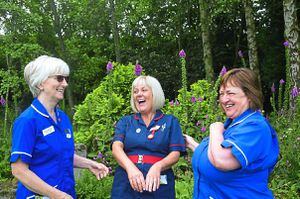
“As soon as I heard about the fundraising to set up the hospice, I knew it was where I wanted to be.”
Three decades later, Helen Duce is still proud to be caring for families at Severn Hospice.
Matron Helen, who along with staff nurses Christine Johnson and Jean Dorsett has been there from the beginning, says despite embracing changes and expansions over the years, the “family feel” and caring values remain the same.
“I have been in a very privileged position to have been looking after patients and their families for 30 years,” she said.
“It has not ever been difficult for me to come to work. Severn Hospice is a massive part of my life. There’s been a lot of changes over the years, but the focus has always been to help more people and their families, and I think we’ve achieved that.
“I love spending time with people to communicate and show how much we care. That’s the meaning of it all.
Fondest
“I want to show people that we can make a difference in so many ways at a very difficult time.”
Helen says one of her fondest memories of working at the hospice is when she granted a patient’s final wish by bringing a baby lamb for her to meet.
“It has always felt like a family here,” she added. “I feel like I’ve been a big part of maintaining the ethos that it’s a compassionate, caring and loving place to be.
“We had a beautiful lady in our care who loved the spring. She did paintings of daffodils and was desperate to see a lamb.
“I brought in our lamb Scud from home; he sat on her bed and she stroked and touched him. I have masses of memories but that’s one of my real favourites – something as simple as that.”

